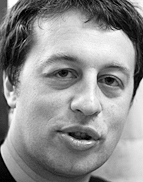 Konstantin Sonin
Konstantin SoninAfter the turbulent events of the summer and protests by the academic community, reforms to the Russian Academy of Sciences were finally signed into law without a lot of noise. But the reform process has yet to begin. Whether or not the reforms succeed, or even whether or not they actually occur, will depend on what happens now.
For example, if the Presidium of the Russian Academy of Sciences gets full control over the newly created agency for managing the academy's property, the "reforms" might have no discernible effect. And even if what seems to me the strangest of the reforms — the forced union of the Russian Academy of Sciences with the Russian Academies of Medical and Agricultural Sciences — is carried out, it might have no major consequences if those institutions remain separate in practice, if not on paper.
At the same time, however, the law is written so as to make it possible to manage Russian science the way it is done in France or Germany. Of course, the law itself cannot guarantee that positive steps will actually be taken. Those depend on the efforts of Russia's scientists. Unfortunately, the law was pushed through so aggressively that it has turned brilliant scientists working in the Russian Academy of Sciences institutions — not to be confused with the veteran apparatchiks of the old Presidium — into really bitter opponents when they were once potential supporters of reform.
Yet neither Russia nor its scientific community is going to disappear, which means that if the scientists will cease their struggle for better organization of science in Russia, it will continue with its current inefficient organization. Ultimately, the authorities and scientists will have to hammer out some sort of solution if they want to continue living and working in this country.
One possible structure of the new agency for managing the Russian Academy of Science property was proposed by a joint task force of the Science Council and the Public Council of the Education and Science Ministry, two advisory bodies. The main goal is to have scientists themselves decide who will conduct research and how, while also allowing the public — through the managing government agency — to monitor and regulate that process. The plan calls for the creation of a "senate," with some members appointed by the executive branch and others elected by the Russian Academy of Sciences.
The proposed plans also call for the opening or closing of laboratories based on findings from an independent audit conducted by leading scientists, regardless of their nationality or place of employment. According to the recommendations of the two councils, that audit will be the main function of the new agency and will enable the public to control budgetary spending on scientific research.
There is only one caveat that I have while looking at the councils' proposal and its possible implementation. Hopefully, scientists realize that any serious audit will lead to a certain number of layoffs and the closing of laboratories and institutions. Otherwise, what is the point of such an audit? That said, it seems that we are, in fact, moving forward.
Konstantin Sonin, a columnist for Vedomosti, is professor of economics and vice rector at the Higher School of Economics in Moscow.
A Message from The Moscow Times:
Dear readers,
We are facing unprecedented challenges. Russia's Prosecutor General's Office has designated The Moscow Times as an "undesirable" organization, criminalizing our work and putting our staff at risk of prosecution. This follows our earlier unjust labeling as a "foreign agent."
These actions are direct attempts to silence independent journalism in Russia. The authorities claim our work "discredits the decisions of the Russian leadership." We see things differently: we strive to provide accurate, unbiased reporting on Russia.
We, the journalists of The Moscow Times, refuse to be silenced. But to continue our work, we need your help.
Your support, no matter how small, makes a world of difference. If you can, please support us monthly starting from just $2. It's quick to set up, and every contribution makes a significant impact.
By supporting The Moscow Times, you're defending open, independent journalism in the face of repression. Thank you for standing with us.
Remind me later.







